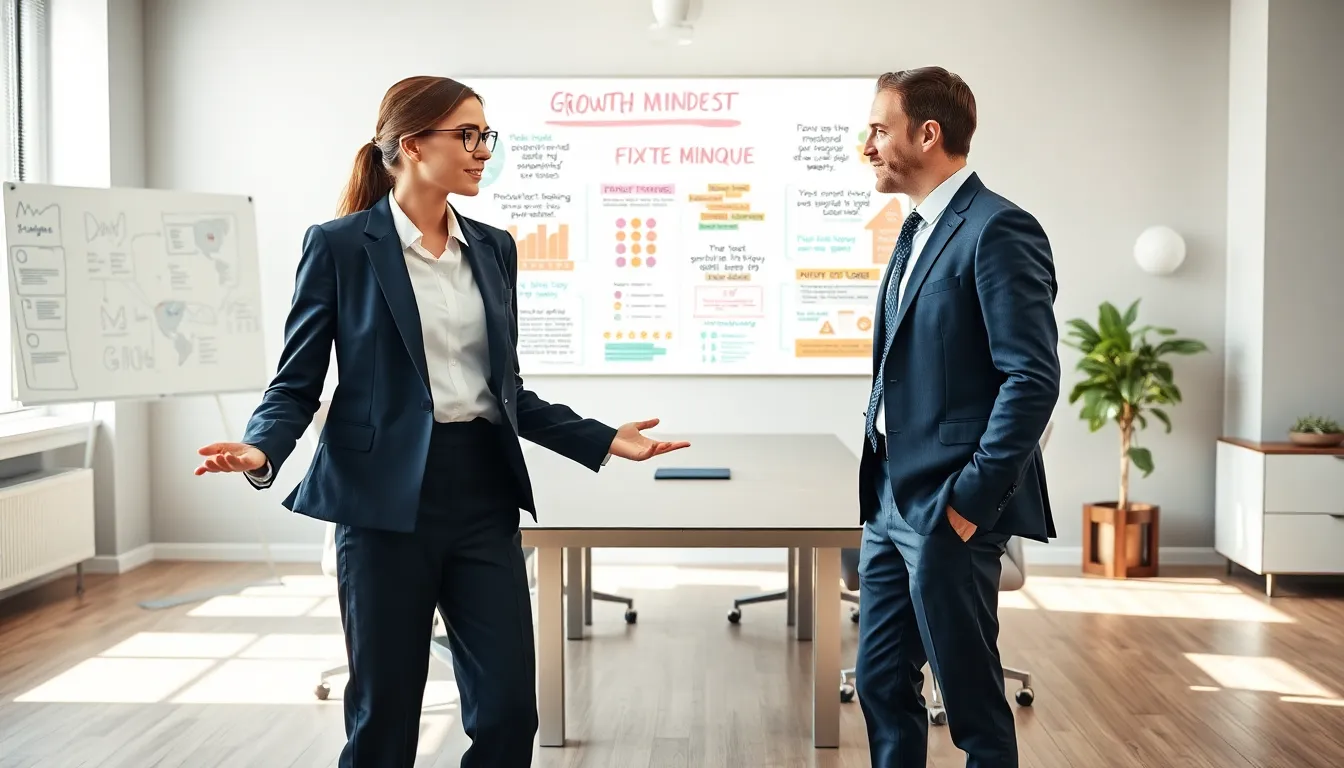Table of Contents
ToggleIn a world where the only constant is change (and maybe your internet connection dropping at the worst possible moment), understanding the difference between a fixed mindset and a growth mindset can feel like your secret weapon. So, why should you care? Because adopting a growth mindset can turn failures into learning experiences and roadblocks into stepping stones. Buckle up as we jump into insightful examples that will have you questioning your own mindset in record time. Get ready to unleash your inner potential and maybe even laugh a little along the way.
Understanding Mindsets

What Is a Fixed Mindset?
A fixed mindset refers to the belief that abilities and intelligence are static traits. People who adopt this mindset often think that their qualities are carved in stone. This perspective limits them. They see effort as fruitless because they believe that if they don’t possess a talent initially, they never will.
Characteristics of a Fixed Mindset
Individuals with a fixed mindset often avoid challenges out of fear of failure. They may also give up easily when faced with obstacles, viewing them as signs of an inability rather than opportunities for growth. Criticism, particularly from others, might feel threatening. Not surprisingly, these traits lead to stagnation in both personal and professional areas.
What Is a Growth Mindset?
On the flip side, a growth mindset encompasses the belief that abilities and intelligence can be developed over time with dedication and hard work. This mindset cultivates resilience, encourages learning from criticism, and motivates individuals to embrace challenges.
Characteristics of a Growth Mindset
People with a growth mindset view challenges as opportunities. They persist in the face of setbacks, knowing that effort leads to skills and improvements. Constructive feedback is welcomed, as it’s seen as a pathway to mastery. They understand that success is a result of hard work and not merely an endowment of talent.
Examples of Fixed Mindset in Action
Education and Academics
Consider a student who believes she will always struggle in math. She encounters a difficult problem and quickly gives up, convinced that no amount of practice could lead to improvement. This fixed viewpoint keeps her from pushing through challenges and discovering her potential.
Workplace Scenarios
Imagine a team member who refrains from sharing innovative ideas during meetings, thinking, “Why should I bother? They won’t be good enough anyway.” By operating under this assumption, they miss the chance to contribute and stifle their professional growth.
Personal Relationships
In relationships, individuals with fixed mindsets might think that their partner will never change bad habits. This belief can lead to frustration and resentment, eventually harming the partnership. Instead of engaging in constructive conversations, they might choose to withdraw, believing any effort is futile.
Examples of Growth Mindset in Action
Education and Academics
In contrast, a student who believes he can improve in math views a hard problem as a thrilling challenge. He spends time practicing and seeks help when needed, gradually becoming more proficient. His determination transforms obstacles into opportunities for growth.
Workplace Scenarios
Picture a professional who proposes a new project idea at work, even though knowing it could fail. Embracing potential setbacks as learning experiences, they take feedback from colleagues to refine the plan. Their willingness to embrace uncertainty paves the way for innovative solutions.
Personal Relationships
In relationships, a person with a growth mindset might approach conflicts with an open mind, believing that their partner can change and grow. They engage in discussions that foster understanding and unity, leading to a deeper bond.
Benefits of Adopting a Growth Mindset
Cultivating a Growth Mindset
Embracing a growth mindset leads to enhanced motivation, resilience, and creativity. People become more likely to set ambitious goals and tackle challenges with enthusiasm. Teams foster collaboration and innovation, eventually leading to improved performance in workplaces. Life becomes a continuous journey of learning and development, noticeably brighter.
Challenges in Transitioning Mindsets
Changing from a fixed to a growth mindset isn’t a walk in the park. It requires commitment and often involves confronting deeply ingrained beliefs. Fear of failure and criticism can hold individuals back. But, acknowledging these challenges is the first step toward transformation. The journey includes developing self-awareness, practicing persistence, and embracing a culture of learning.







